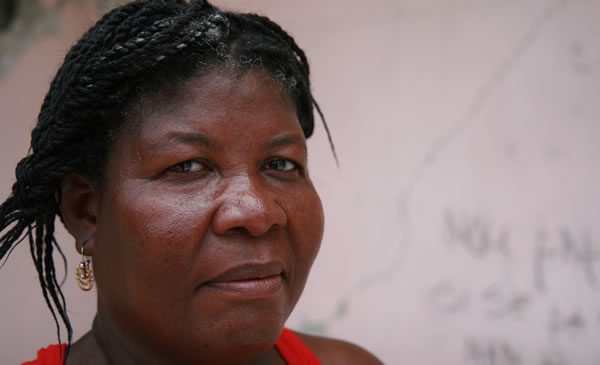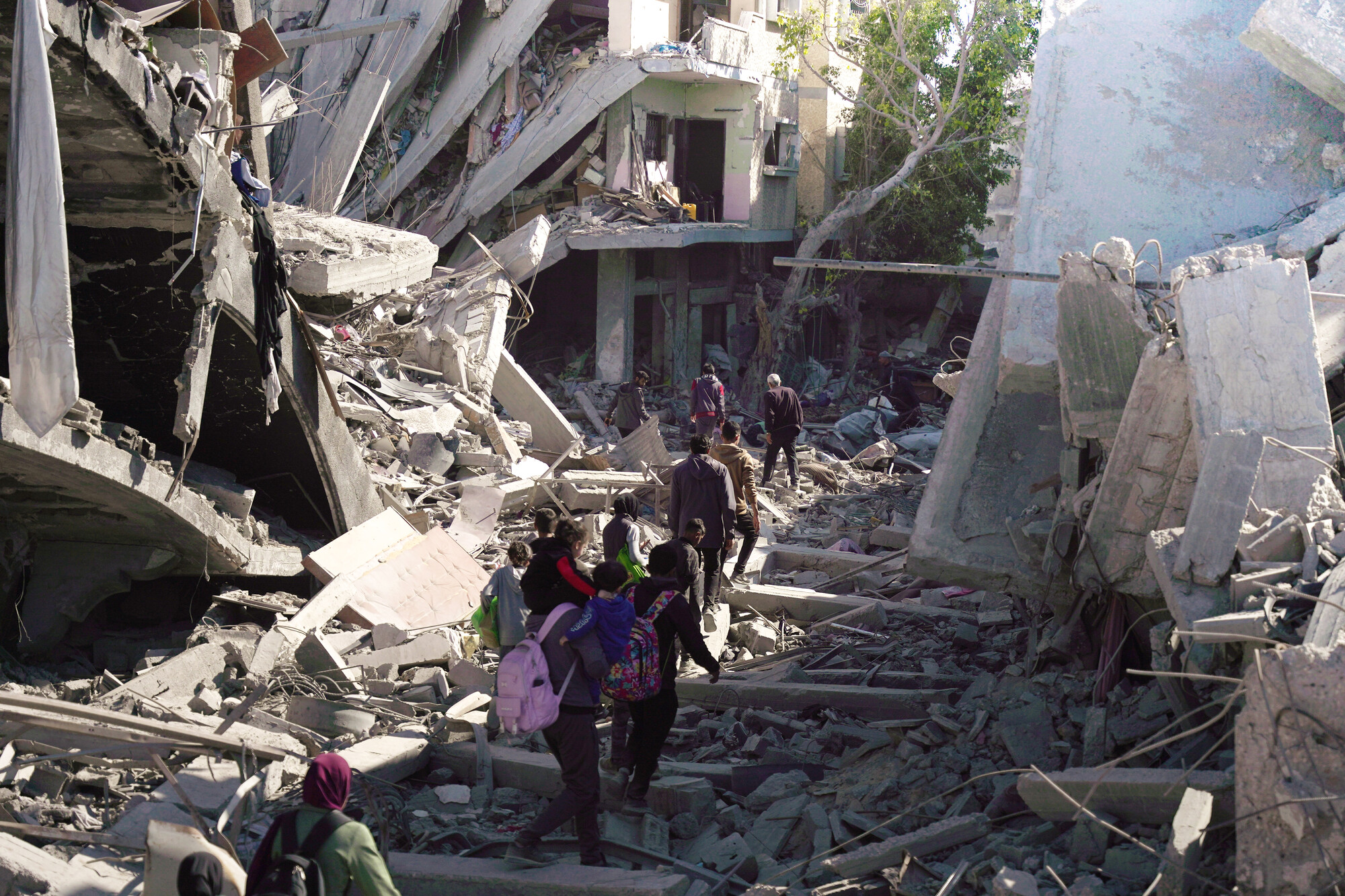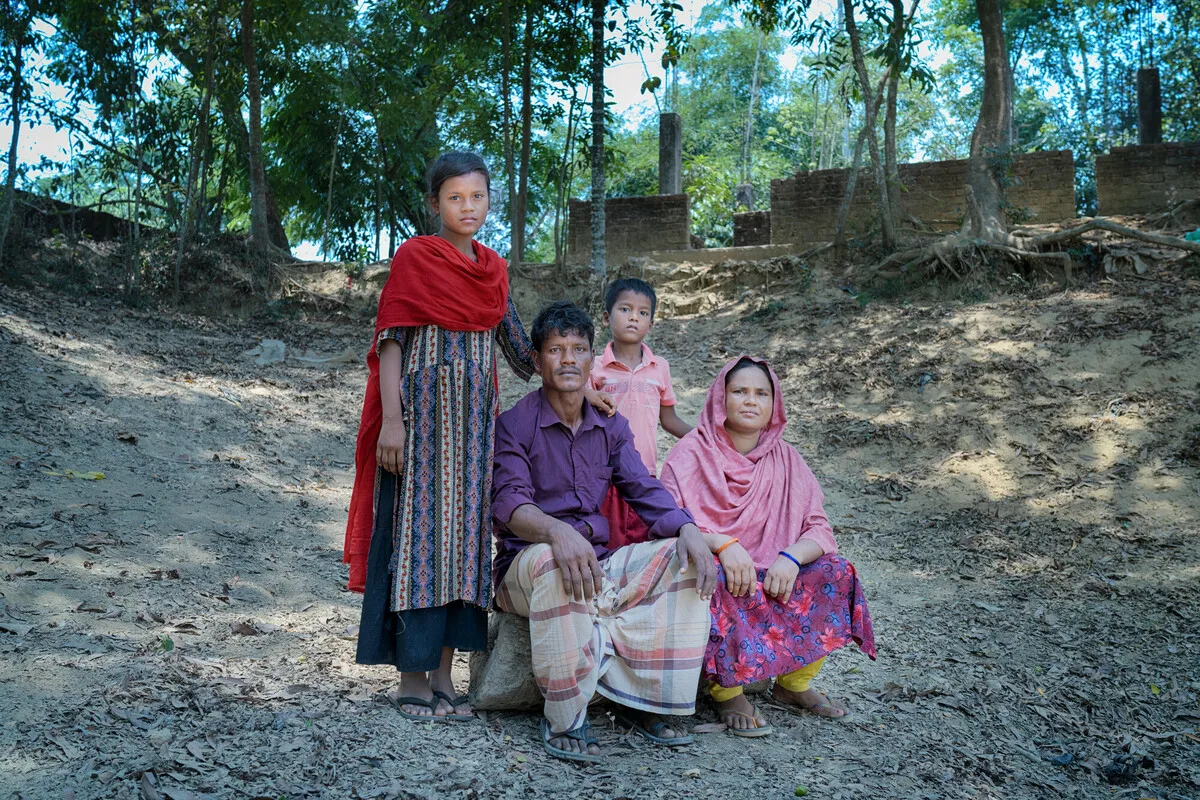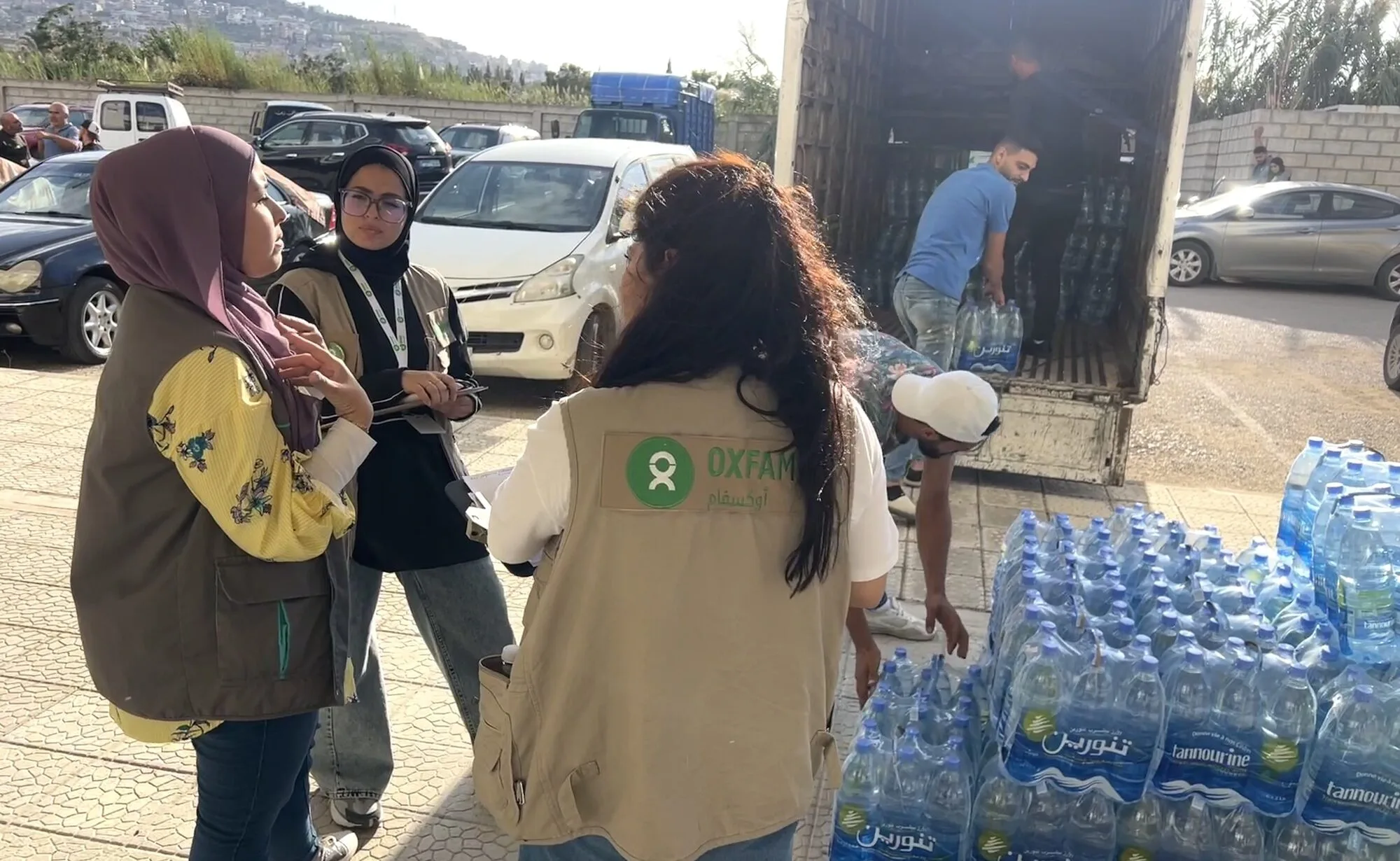Marie Carole Boucicaut survived the Haiti earthquake of January 2010, but lost her home and business. Chosen by Oxfam to run a community canteen, she’s helped hundreds of people to recover, and now is well and truly “back on her feet”.
Marie lives in Campeche, an area of Carrefour Feuilles, a poor area of the city of Port-au-Prince. The whole area is packed with small buildings that climb up steep paths up the hillsides and ravines. This area was one of the worst affected by the earthquake, and huge amounts of rubble still cover building plots and roads and paths.
Marie is one of the 56 women who ran Oxfam’s very first community canteens. The canteens started in March 2010 and ran for two months in some of the areas of Port-au-Prince. Oxfam supported her financially so that she could feed 80 of the most vulnerable people in her immediate community and make a profit for herself, as a first step to regaining her own livelihood.
We met first in April 2010
Before the earthquake, Marie Carole had a grocery store where she sold goods in bulk. ‘I sold things like rice, salt, condiments…many things. I was in a meeting when the earthquake struck. When I came home I found the house was falling down so I stayed away, but people came and looted everything I had in my shop. The top part of my house was leaning over the bottom part and had to be demolished –what’s left is nothing and there is nothing I can do with it.’
‘This area where we live is now very bad – it’s not fit for humans to live. When it rains we have to stand, and it’s rained every night recently; we have no choice but to stay awake. We stay awake and tell jokes. We lost a brother in the earthquake and since then our mother has been very down so we’ve been trying to encourage her. When we told her a joke she started to smile, so now we tell her jokes to make her laugh: we want her to smile again.
‘I hope in the future I will have another shop. Having a shop is what I do. I hope to get my shop back.
Oxfam’s Emergency Food security and Livelihood (EFSL) programme in Haiti helps people to regain their means of earning a living. The programme began in March 2010, with 56 community canteens, each of which supported one canteen ‘owner’ and fed 80 of the most vulnerable people in their community. Marie Carole was one of the first women to be selected to run a canteen.
‘I was given the opportunity to run this canteen and I really like it. I don’t run it alone, I have some help from my family –- the children before they go to school — and I have a niece who is helping me at the moment. For other things I have to rely on God. I believe in God and Oxfam.
‘Through the canteen I’m able to help people in the area. I cook for 80 people who are need of food.
‘The canteen is helping me too because we are no longer hungry. I make about 1,500 Gourde profit every week. There are nine of us living together in a shelter – including my mother, my two sisters, one brother and three of my brother’s children. We were not living together before the earthquake though we were living nearby, and I was living alone. The earthquake has meant we are now all living together. We don’t have a tent; we’ve made a shelter with some metal sheets, a little distance from here.
‘I have to get up very early, around 5 am, to start cooking so that I have things boxed up for when people come to collect their meals. I have a lot to do as I’ve 80 plates of food to cook, and if I don’t, I’ll find a large queue of people! I vary the meals: sometimes it’s rice, beans and vegetables, or meat and a sauce. I wouldn’t be able to cook all that by myself so I have others to help. The children help when they are not at school, and some of my dead brother’s children help, and so does my husband’s niece.
‘I buy a lot of the food from a market about two miles away. I go every Saturday and buy enough for two days. I buy meat every day. I cook in the canteen from Monday to Friday — there is no canteen on Saturdays and Sundays. Food is now more expensive than before the earthquake.
June 2010
The next time we meet is in June and Marie Carole is waiting at her shop: a stall covered with a large awning outside an old water kiosk – a two-storey building for selling water now reduced to one. She pulls up a couple of small chairs for us and we start talking.
‘Things were difficult right after the earthquake, but we’re Haitian so we have to get up and move forward.
The community canteen really helped me; I was able to start my business back up and now I have my own shop again. Every week, while I had the canteen, I would put aside some of the profits, 1000 gourdes here and a 1000 gourdes there, and then I would send the girls to go and buy things for my shop. I also borrowed a little money so that I could buy the rest of my stock. Now I sell all sorts of things: rice, sugar, beans, pasta, charcoal – all sorts of things.’
I ask Marie Carole to show me her stock and she is very happy to oblige. She shows me the beans and grains first, all lined up neatly to one side in canvas sacks. She scoops handfuls out for me to inspect them: kidney beans, black beans, little green beans she calls French beans, Miami beans, wheat, cornmeal and corn kernels. The corn is for chicken-feed, she specifies, not people!
For such a small shop, the range of stock is impressive. Marie Carole pulls out strings of milk-cartons, little pink bottles of shampoo, sweets, and even long tins holding pencils, an eraser, pencil sharpener, ruler and pair of compasses – just what every school child needs!
‘Marie Carole puts everything back in place and sits down again. ‘I went all the way down to Croix des Bouquets to buy the stock at the market there. My brother came with me to help. With the canteen and now this shop, at least we can all eat. There are still ten of us living together, as we have since the earthquake, in a shelter made of tin sheets. Now we have some plastic sheeting too, some from Oxfam and some we bought, so now when it rains we don’t get wet like we did before.’
We are momentarily interrupted by the arrival of a customer, a little girl of five or six, who has been sent to the shop to buy some snacks – crisps or crackers of some kind. She is very shy around us and rushes off without waiting for her change. Marie Carole laughs and puts the coins on the counter – the little girl will be back!
‘The problem is,’ she continues, ‘the building is not mine. I have an arrangement with the owners: I paid them six-months rent in advance and they have let me set up my shop outside the bottom floor since they can’t use it for selling water from any more. The top floor collapsed in the earthquake, and the ceiling is cracked and leaks so some of my stock got wet – all the plastic bags I bought to put my customers’ goods in. Because the first floor has fallen, I don’t like to go inside, so I didn’t immediately see that my things were getting we because of the leak. It’s hard to manage my stock.’
‘Is life improving here?’ I ask. She tells me that for some people life is still very hard: ‘many still don’t have enough to eat and neither do they have a safe place to sleep.’
So what needs to happen? ‘You should be helping people to rehabilitate themselves,’ she tells me. ‘It would be good if Oxfam opened the canteens again too; there are very many people here without enough to eat.’
In September 2010 we met again
Marie Carole still had her shop at the old water kiosk, and business was good. And she had some news for me:
‘People from Oxfam came to inspect the site of my old shop – the one I had before the earthquake. They saw that it had been destroyed, and they are going to provide me with a shipping container so I can use it as a shop and have room to store my stock more securely. That will be much better for my business. I will be able to buy more, and I will be able to manage my stock better from there.’
The Oxfam team selected one hundred and four shop-owners who received business management training and a grant of 1,000 US dollars with a matching loan of 1,000 dollars. Fifteen of them – and Marie Carole is one – will each receive a shipping container modified so that they can be used as a shop premises and secure storage.
I ask her what her biggest needs are now, but she is reluctant to answer. She shrugs. ‘Oxfam is the only organisation helping this community. Many things would help me, but I don’t want to ask for too many things. You can’t constantly ask for people to give and give. I am satisfied with what God gives me. With ten people to feed I cannot save money, but either with more money, or the container from Oxfam, I would be able to get on even better than now, expand my shop, sell more and make more money to improve our shelter and improve our life.’
‘There are always needs, but as long as we are healthy, and we have two hands and feet, we can find things to do and we will continue living. Things will get better.’
It is now February 2011
Time for my last meeting with Marie Carole. She has good news for me, and greets me with a huge smile:
‘I received the container in the last week of December and the cash grant from Oxfam a few days later. Please come and see all the stock I have been able to put together thanks to the Almighty and to Oxfam.
‘Early in the morning, I wake up and open the shop with the help of my young niece. I have kept my seat by my old stall at the crossroads: everybody passes by and this makes my sales much better. With all my products nicely arranged on the table, you can’t miss me!
‘I’m selling a lot of items, a little bit of everything, a “meli melo” (if I can use one of our lovely Creole expressions). Here, we are in the middle of an urban area but sometimes it feels like being in a rural village. People like to shop at one place for everything they need. And this is one of my strengths: I’m the one stop shop!
‘You need food products, sodas, housekeeping and maintenance products, sewing supplies… for almost everything, just ask; I’m retailing and even wholesaling.
‘My clientele has grown considerably: old residents of the neighbourhood still consider me as the perfect place to stop by for shopping, and IDPs living in the camps all around here are now buying from me too. It’s true that a shop placed closer to the main road is selling more than me, but I’m doing well here and I don’t have any reason to complain.
‘My domestic situation has not changed a lot. I’m still living in a temporary shelter built from metal sheets with 10 other members of my family: my husband, my mother, my sister and my nephews and nieces. My husband is a mechanic and he goes out every day and sometimes he brings home the fruit of his daily labour and sometimes brings nothing. Only the two of us have “regular” incomes so we are fighting because the daily needs (food, clothes, school, health care…) of the whole family depend on us. At home, my husband will give the money for breakfast and I will do my best to take care of the midday meal. In the evening, I cook porridge to sell, and everybody at home has a plateful for dinner. I also gave 40 per cent of the money I received from a tontine to my family to make sure they can meet their basic needs. I can’t do more to satisfy everybody’s needs. I can’t take too much money out of the business because I’m in a development phase and need to be cautious about how I’m using my income.
‘With the grant we’ve been given — and the loan we received from CECACHE thanks to Oxfam — a lot of us got solid support that will empower even the worst affected people. In my case, the domestic responsibilities are major obstacle to my business expansion, but I’m confident. I know I’m not alone in this fight. I believe God is by my side. When I think about January 12th and the first days after this disaster, I can say there was no more hope. And now, it’s just amazing: I’m back on my feet!’
Glossary
Tontine: Often also called a sol, a form of savings club and is very popular because, despite the risks, it allows individuals to obtain lump sums of money.



